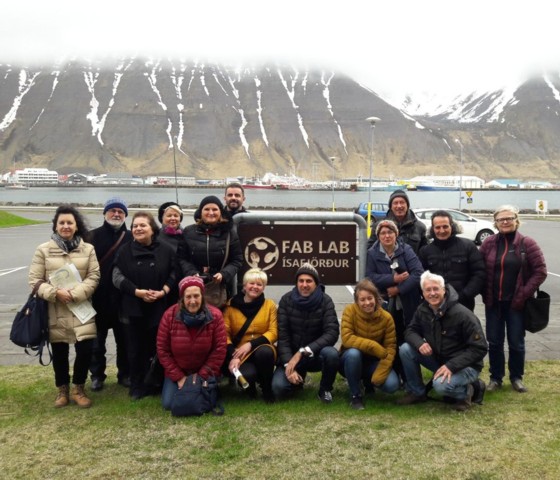|
  Grunnskolinn a
Isafirdi. Isafjardarbaer.
Austurvegur 6.
Iceland.
IS002 -
Landsbyggð Grunnskolinn a
Isafirdi. Isafjardarbaer.
Austurvegur 6.
Iceland.
IS002 -
Landsbyggð
www.grisa.isafjordur.is
grisa@isafjordur.is
18.05.2017
Fab-lab class

A fab lab (fabrication laboratory) is a small-scale workshop offering
(personal) digital fabrication.
A fab lab is generally equipped with an array of flexible
computer-controlled tools that cover several different length scales
and various materials, with the aim to make "almost anything".
This includes technology-enabled products generally
perceived as limited to mass production.
While fab labs have yet to compete with mass production and
its associated economies of scale in fabricating widely distributed
products, they have already shown the potential to empower
individuals to create smart devices for themselves. These devices
can be tailored to local or personal needs in ways that are not
practical or economical using mass production.
The fab lab movement is closely aligned with the DIY, the open
source hardware and the free and open source movement, and shares
philosophy as also technology with them.
History
The fab lab program was initiated to broadly explore how the
content of information relates to its physical representation and
how an under-served community can be powered by technology at the
grassroots level. The program began as a collaboration between the
Grassroots Invention Group and the Center for Bits and Atoms at the Media
Lab in the Massachusetts Institute of Technology with a grant from
the National Science Foundation (Washington, D.C.) in 2001.
Vigyan Ashram in India was the first fab lab to be set up
outside MIT. It is established in 2002 and received capital
equipment by NSF-USA and IITK
While the Grassroots Invention Group is no longer in the
Media Lab, The Center for Bits and Atoms consortium is still
actively involved in continuing research in areas related to
description and fabrication but does not operate or maintain any of
the labs worldwide (with the excmobile fab lab). The fab lab concept
also grew out of a popular class at MIT (MAS.863) named "How To Make
(Almost) Anything". The class is still offered in the fall semesters.
Popular equipment and projects
Flexible manufacturing equipment within a fab lab can include:
Mainly, a rapid prototyper: typically a 3D printer of plastic
or plaster parts
3-axis CNC machines: 3 or more axes, computer-controlled
subtractive milling or turning machines
Printed circuit board milling or etching: two-dimensional,
high precision milling to create circuit traces in pre-clad copper
boards
Microprocessor and digital electronics design, assembly, and
test stations
Cutters, for sheet material: laser cutter, plasma cutter, water
jet cutter, knife cutter
FabFi
Main article: FabFi
One of the larger projects undertaken by fab labs include
free community FabFi wireless networks (in Afghanistan, Kenya and
the US). The first city-scale FabFi network, set up in Afghanistan,
has remained in place and active for three years under community
supervision and with no special maintenance. The network in Kenya, (Based
in the University of Nairobi (UoN)) building on that experience,
started to experiment with controlling service quality and providing
added services for a fee to make the network cost-neutral.
List of labs
MIT maintained a listing of all official Fab Labs, worldwide,
until 2014. Nowadays listing of all official Fab Labs maintained by
community using site fablabs.io. As of October 2016 there were 713
in the world in total.
Currently there are Fab Labs on every continent
except Antarctica.
|
|

